home | north bay bohemian index | features | north bay | feature story
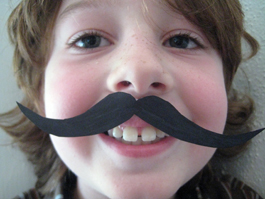
Photograph by Gabe Meline
Face Foliage: Eight-year-old Sylvan Talavera is just one of those who gamely dons our fake fur.
Babes in Hairland
Below the nose, it grows. Like 'em or not, mustaches are back
By Gillian Reagan
Eric Fiore, a mustached 26-year-old video editor, was lounging on a sidewalk on a recent sunny Saturday afternoon, munching a slice of pizza—the vegan veggie kind, extra spicy, with a dash of special hot sauce that he keeps in his messenger bag. Out of the many mustache monikers to choose from ("face foliage," "cookie duster," "flavor saver," "soup strainer," "nose neighbor," "mouth brow"), Fiore likes to call his the "lip tickler."
"Because it's hilarious, all the time," he explains. "It makes people laugh every time they see me."
Fiore wore black cut-offs, a mustard-yellow T-shirt and a block of dark brown facial hair over his lip that would make him appear rather walruslike if he wasn't so rail thin. "I hope the mustache is making a comeback," he says. "More people should appreciate it. I'm saying it has magical powers."
There's no question that the mustache is having a moment. Walk through any hipster neighborhood, and many twenty- to early thirty-something guys will saunter by sporting some kind of lip awning. Whether big, thick, bushy beasts or filmy, sparse little squiggles, mustaches are rising once more from the stubble.
And who is that mustached man? He appears to be a pretty ballsy breed, having bypassed the beard, that bush of whiskers grown by professors, hippies, urban wannabe lumberjacks and lazy guys who read too much Nietzsche. He's not afraid to bust in on the territory of blue-collar workers and cops, villains (think: Hitler), old-timey bank robbers and creepy dudes to claim his very own parcel of hair-land. And he's willing to express himself, whether with a pencil-thin growth above the lip à la John Waters, or a broom-bottom Mr. Monopoly number that looks like a disguise.
Socratis Mamalis Jr. wears what he calls a "molester 'stache," a sparse, slightly pubescent mustache that lends him a striking resemblance to JD Samson, the guitarist from feminist dance-punk band Le Tigre, who cultivates a patch of pitch-black peach fuzz above her lip. Mamalis, 24, who goes by "Soci" or "Crates," explained during a recent indie rock show that he started growing his mustache about a month ago from "boredom slash the fact that I look like I'm 12.
"Basically, I grew it so I could ask, 'Who wants a mustache ride?'" he adds with a wicked grin. He works in sales for a printing company. "I've noticed the ladies love it."
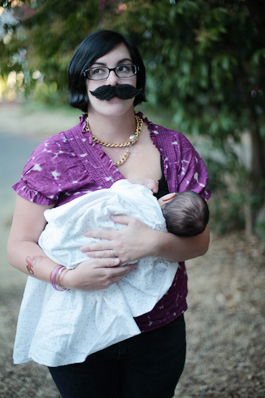
Photograph by Elizabeth Seward
Really? Not according to Cara Graff.
"They're such a turnoff," says Graff, 29. "I want a guy to take care of himself, and, yeah, it definitely gives a guy an 'I don't give a fuck' attitude." She adds, "It's one thing to have confidence, but to make yourself look hideous just for kicks? That's stupid."
Mitch Goldman, 32, grows a mustache for the charity Mustaches for Kids, which benefits the Make-A-Wish Foundation, each fall. When he first told his girlfriend his plan, Goldman says over the phone from his job as a home nurse, "It was like I told her I had a sexually transmitted disease. Literally head in her hands, just shaking her head.
"But I don't know, some people like it," he continues. "It gives guys a little swagger of masculinity or something."
Who's Sweeping the Nose Broom?
There is something about the mustache. It adds mystery. Having one says, "I'm masculine!" or "I'm a rebel!" A few years ago, the mustache was largely referred to as ironic, as in "ironic mustache," since (besides baseball players, of course) it showed up mostly on sleazeball celebs like photographer Terry Richardson and American Apparel's notorious founder Dov Charney, both of whom seemed eager to look as repulsive as possible. But recently, the novelty of the ironic lip sweater has faded. The mustache has perhaps become a more stately, classic, even admirable facial fashion. Like high-waisted short shorts or a muscle shirt, it takes guts to wear one.
"Anybody who wants attention, there's nothing like a mustache to make people start talking about you," says Jay Della Valle, 28, chairman of the American Mustache Institute, a joke organization started in 2006 that somehow turned legitimate once the mustache became popular.
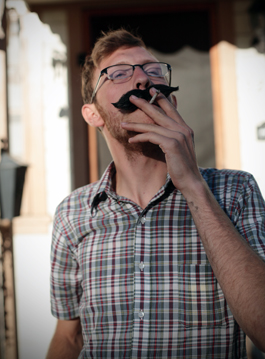
Photograph by Elizabeth Seward
Della Valle's own mustache is puffy in the middle, but he uses wax to make it curl at the ends. "That's like [Jason] Giambi. The power of the mustache is behind him."
The Yankees slugger's mustache has transformed him from sleazy steroid-taking pariah to hometown hero. Fielder Johnny Damon and Giambi started growing their mustaches as a joke during Giambi's slump in the early spring. But now the first baseman has 19 home runs and 55 RBIs. In an attempt to raise support to get him voted onto the American League's All-Star team, the Yankees handed out 20,000 fake bushy mustaches to fans at a recent game, transforming the crowd into a sea of Swedish Chefs. (Remember the Muppets?)
"I didn't really think I was going to turn into a fashion icon," Giambi told reporters.
But he's only one celeb rocking the lip caterpillar. In movies, of course, Daniel Day-Lewis, Josh Brolin and Ryan Gosling (in Lars and the Real Girl) all wore them last year. Matt Damon added one (as well as some extra pounds) for his role in Steven Soderbergh's Informant. Sacha Baron Cohen wore an especially unwieldy 'stache as the slapstick foreigner Borat (but has since shaved the "sexytime" cookie duster to redefine his career), and Mark Ruffalo, Jack Black, Sean Penn, Will Ferrell, Terrence Howard, Leonardo DiCaprio and Orlando Bloom have all been known to sport them on the screen and off. And, if these examples aren't proof enough that the mustache has gravitas, even Obama's top aides are mustached men, including senior Obama campaign adviser David Axelrod and Eric Holder, a former deputy attorney general.
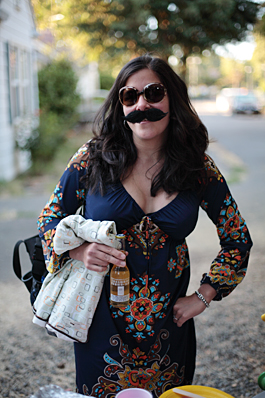
Photograph by Elizabeth Seward
Man's Best Friend
The mustache, of course, has a rich and storied history. In the 1840s, mustaches were prominent among politicians and dignified cultural types like Charles Dickens and poet Henry Wadsworth Longfellow. But by the early 1900s, they could signify that you were a soldier; the British Army actually made them mandatory. The mustache became a symbol of militarism during both of the world wars. Hitler's style of mustache—a rectangular brush just above the center lip—carries the stigma of sinisterism today and is rarely, if ever, seen. Though of course, surrealist artist Salvador Dali tried to lighten things up in this era with his handlebar.
The '60s sexual revolution revamped the mustache style, as porn stars and musicians from the Beatles to Jimi Hendrix to Frank Zappa wore them proudly. So did Martin Luther King Jr. After the 1969 Stonewall riots garnered national attention for gay rights, homosexual men warmed to the mustache as part of the Christopher Street clone look, which also included flannel shirts, snug jeans and cropped hair.
In America, of course, the nose broom eventually became most strongly associated not with cops or firemen, but with baseball players. This began in 1971 when Charlie Finley, the 'stache-loving owner of the Oakland A's, paid his players (including star pitcher Rollie Fingers) $300 to allow their upper lip hair to grow so that the team would look different from the rest of the league. Over the years, Yankee players including Thurman "I Am the Walrus" Munson, Rich "Goose" Gossage, Reggie Jackson and Jim "Catfish" Hunter have all sported a mustache.
But the mustache first became associated with pure, unbridled machismo thanks to '70s box office king Burt Reynolds. He thrashed around onscreen with a 'stache in the second largest grossing movie of 1977, Smokey and the Bandit (Star Wars was No. 1). Today, Reynolds' facial-hair style is still revered. His mustache has an unofficial Facebook page, and there is a band, a record label and a blog called "Burt Reynolds' Mustache." Tom Selleck brought the big bushy style through the '80s as debonair detective Magnum P.I.
But from the '90s to now, the mustache has lacked a true mascot (though Jason Lee, on My Name Is Earl, is a decent candidate). Perhaps this has made it free enough from association for any confident young man to grow one out, try one on, to experiment.
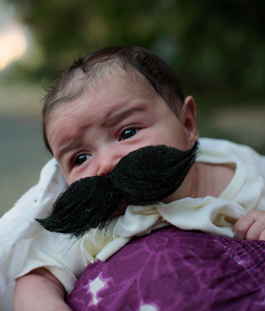
Photograph by Elizabeth Seward
Chick Filter
Thirty-year-old Frank Deleon-Jones, a lanky guy with a crown of frizzy black curls, explained that growing a mustache is just a way to change up his looks, like getting a new haircut or seeing if shorts are his style. Others, however, have different motivations.
"Sometimes there is a peacock factor there," he says. "They maybe need to compensate for something." Like what?
"Personality, confidence . . . other things."
Della Valle, the American Mustache Institute chairman, made a feature-length documentary in 2005 about his quest to encourage men his age to grow mustaches. In the Glorius Mustache Challenge (sic), he issued this challenge to twenty-something men across the country: grow a mustache for one month. He got 50 people to participate. In New York, he held a "protest march" for mustache rights in Union Square. Each year, Della Valle and the American Mustache Institute host a Stache Bash challenge to determine which mustache reigns supreme in the states.
Della Valle grew a mustache for the first time when he started shooting the film. "I'm in a band. I'm a rocker. I don't give a fuck," he says. "But [people] gave me so much shit." He shaved as soon as the movie found a distributor. "The next day, I felt like my best friend went away. Every time I would shave it, I was like, I need to grow it back. I'm like a lifer now. My girlfriend says it looks ridiculous. I don't listen.
"These guys with 'staches, they're not thinking about chicks," Della Valle continues. "They're thinking, I'm going to have fun with this. I'm gonna do this and this is my thing. They're so happy, they're walking around with a little more skip to their step." Then, he points out, "chicks react to that."
Favorably, too.
He describes a scene in the movie in which one mustache grower explained that the mustache is like a filter for girls. The ones who wouldn't be interested in a guy with a mustache are probably too stiff to be around anyway.
What about guys who are repulsed by mustaches? "It's because you're jealous," Della Valle calmly explains. "It's like, it's the one thing you can't do. You're just mad because you can't do this."
Spoken like a true mustache man.
Send a letter to the editor about this story.
|
|
|
|
|
|